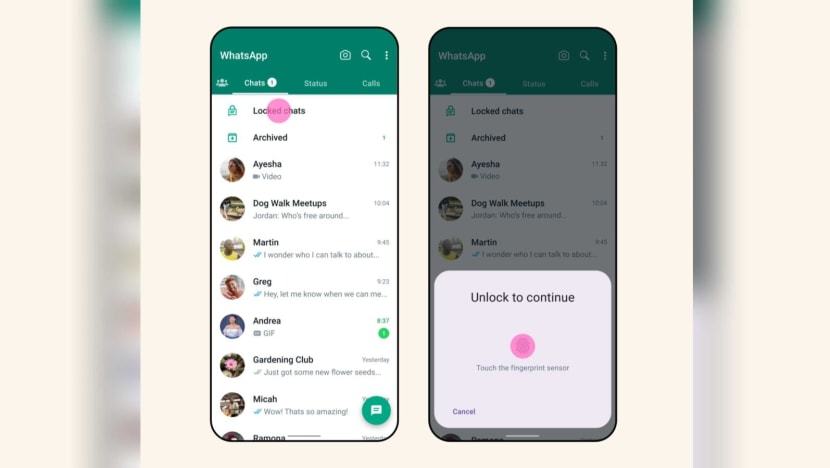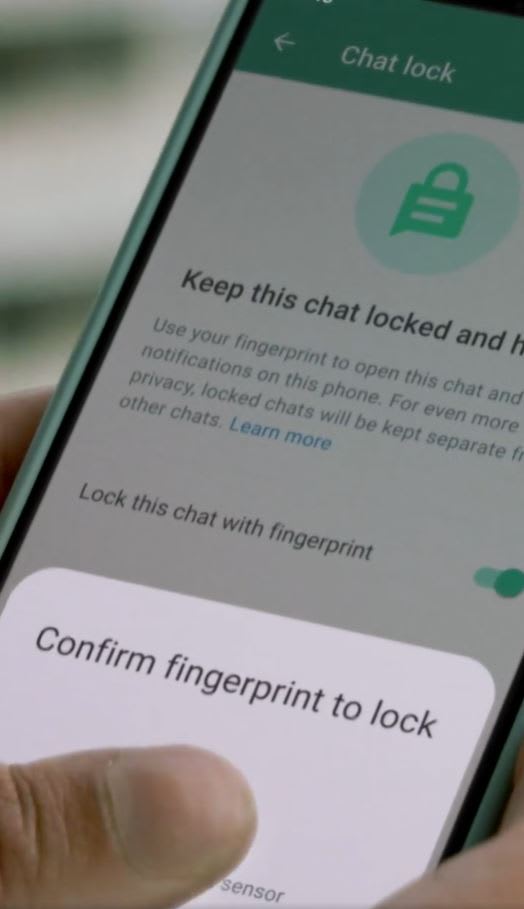Commentary: Is WhatsApp's new Chat Lock feature a friend or foe in relationships?
Securing our devices and chats may help protect our personal information, but it does little to build trust in romantic relationships, says psychiatrist Lim Boon Leng.

WhatsApp's new Chat Lock feature allows users to keep chats private by requiring a passcode or biometrics. (Image: WhatsApp)
SINGAPORE: If curiosity can kill a cat, it can certainly end marriages.
The recent introduction of WhatsApp’s Chat Lock feature has sparked discussion among my peers about the impact it may have on relationships. While I wonder if it can prevent conflict caused by partners snooping on each other's chats, I also have reservations about its effectiveness.
As a psychiatrist, I have observed the detrimental effects of snooping on romantic relationships and marriages and the critical role trust plays in healthy partnerships.
WHY SNOOP?
Many individuals snoop on their spouses’ smart devices out of sheer curiosity. The accessibility of an unlocked phone can tempt someone to peek into their partner's conversations.
In a recent poll by Secure Data Recovery Services in the United States, 82 per cent of respondents admitted to having snooped through someone else's device at some point.
This is further affirmed by a 2012 study published in the American Psychological Association, which found that two-thirds (66 per cent) of their respondents had gone through their partners’ phones, most often when their other halves were in the shower.
Besides curiosity, suspicion that a partner is cheating or loss of trust can lead individuals to engage in snooping behaviour.

This may come after they perceive changes in their partner’s attitudes towards them, or suspicious behaviour like spending an unusual amount of time on their devices. They may hope to find evidence of infidelity or deceit by checking their partners’ mobile phones.
Insecurity, low self-esteem, poor communication, or past experiences of betrayal can also increase the likelihood of snooping in relationships. Some individuals cannot tolerate the anxiety of uncertainties in their relationships and hope to eliminate their fears by checking on every aspect of their partner’s activities.
Additionally, some individuals may suffer from mental illnesses such as morbid jealousy, characterised by irrational thoughts and extreme behaviours related to unfounded obsessions and suspicions of a partner's infidelity.
Underlying conditions like delusions, obsessions, and severe anxiety disorders often account for morbid jealousy.
ILL EFFECTS OF SNOOPING ON RELATIONSHIPS
Snooping is a breach of trust that immediately fractures the foundations of a relationship. When one partner invades the other's privacy without consent, it sends a clear message that the snooper does not trust their partner. This breach of trust is harmful to the relationship or marriage.
Moreover, any information obtained through covert means cannot be clarified without admitting to the breach of trust and risking further conflict.
Research has shown that the unauthorised surveillance of partners’ mobile phones often leads to the breaking up of relationships.
However, it is more important to view snooping behaviour as a symptom, rather than the diagnosis or the underlying issue itself.
Simply put, apart from cases of mental illnesses, it is likely that the trust between the couple has already been compromised and that the relationship is already insecure for one to have doubts and to start snooping into the partner’s phone.
IS IT EVER ACCEPTABLE TO CHECK YOUR SPOUSE'S PHONE?
In a healthy relationship built on trust and open communication, the need to check one's partner's calls or messages should not arise. Trusting couples often share devices or passwords, demonstrating their mutual respect and confidence in each other.
However, there may be instances where infidelity has occurred, and both partners can agree to have their phones checked as part of the process of rebuilding trust. This decision should be based on open communication and the willingness to restore the relationship.
In my psychiatric practice, I have witnessed numerous cases where patients discovered their partners' indiscretions through snooping. However, it was ultimately the breach of trust resulting from the revelation of infidelity that led to relationship breakdowns, not the act of snooping itself.

Interestingly, even in cases of years of extreme snooping and accusations of infidelity due to delusional jealousy, aggrieved spouses continue to stand by their partners.
For individuals who engage in snooping behaviour, it is essential to recognise the futility of their negative suspicious thought processes leading up to the snooping. Negative thoughts that a partner has done something wrong only perpetuates a cycle of resentment, distance, further suspicion and a need to snoop.
Instead, it is crucial to start working on building trust in the relationship. Have open and honest conversations with your partner, and express your concerns, insecurities, and fears.
Ironically, there have been cases where the fear of one’s partner cheating can sometimes be a self-fulfilling prophecy with a partner citing the stress of dealing with a jealous spouse as one of the reasons for their discretion.
If discussions become heated, seeking the assistance of a couple or marriage counsellor can facilitate non-confrontational communication, as well as establish healthy boundaries, and further rebuild trust.
At the end of the day, securing our devices and chats may help protect our personal information, but it does little to build trust in romantic relationships.
Double or triple-locking a chat only serves as a red flag that one has something to hide from one’s partner and does nothing more than arouse suspicion.
Dr Lim Boon Leng is a psychiatrist at the Gleneagles Medical Centre.


















